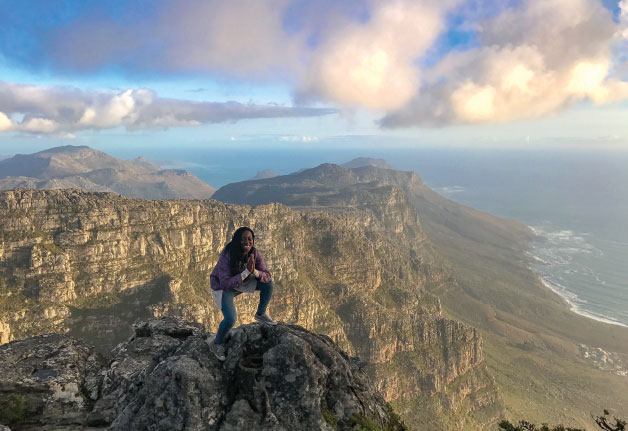During her five months of conducting research in South Africa, Peru and Morocco as Wofford’s 34th Presidential International Scholar, Victoria Nwankudu learned a lot about the world and herself.
The Presidential International Scholarship is an innovative program that allows one student to travel internationally to research an independent project. The scholar is selected by the president of the college as a student with exceptional potential to benefit humankind as evidenced by a demonstrated passion for service learning combined with a globally minded intellectual curiosity. The scholarship is funded by an anonymous donor.
Nwankudu spent the summer of 2017 and the fall semester traveling as the scholar.
“Traveling in South Africa was the first time I blended into the population while studying abroad,” says Nwankudu, whose family is from Nigeria and now lives in Florence, S.C. “In Argentina, for example, when I studied there, I stuck out like a sore thumb. It was really interesting to be in South Africa and not looking different.”
Nwankudu discovered many differences there, still, one being her own stereotypical idea of Africans. “I should know this, my family being from Nigeria, but I expected Africans to be the same. In Cape Town, Africans were so diverse. I had never met such a diverse people. I didn’t realize I had a stereotypical idea of who they were, but I did. Africans are super different. They broke my stereotypes and expanded what it means to be African-American, what it means to be Nigerian-American.”
In Morocco, Nwankudu experienced stereotypes herself as she was mistaken for a migrant worker because of the color of her skin. “People would not believe I was American,” she says. “It was hard to get respect, and I experienced cat calls and side eyes. I had a split identity imposed on me there.”
Still, Morocco was “gorgeous” and had “the best food,” and being there was an experience Nwankudu says she will never forget.
Nwankudu began learning Arabic, admittedly difficult, “but for some reason, I find it a bit rewarding. I had never thought about learning Arabic until this, and it’s because of going to Morocco.”
Nwankudu’s research as the Presidential International Scholar centered on the impact of language on social movements.
She says she learned that languages are tools, and people use the ones they are most familiar with and those they have been taught to use in certain social situations, likening it to building a chair. “You may have a wrench or a hammer. Which do you use? You pick the tools you have seen others use or you have been taught to use – those you’ve been socialized to use. You don’t have to think about it.
“People don’t think much about the language they choose to use either,” she adds. “We don’t think like that. I expected people to have purposeful uses for their languages, but they spoke freely. We use the tools that most likely will get the job done.”
Even in making political statements, people usually are not thinking about the language they use, Nwankudu says. “People use language for efficiency in protest. If the goal is to reach across ethnic lines, they choose the language everybody speaks.”
She found, though, in areas where many languages are spoken and some ethnic groups are shunned or isolated for political reasons, the choice of language in protest can be used effectively. During the Moroccan protests of 2011 and 2012, inspired by the earlier Arab Spring protests in other areas of the region, for example, speaking Arabic became important, she says. Instead of using Modern Standard Arabic or French, considered the languages of the elite, the movement began using Moroccan Arabic, known as Darija, the spoken native vernacular. “It was putting the protests in the people’s own language,” Nwankudu says. “It was the first time since Moroccan independence (from France in 1956) that they used Moroccan Arabic in protest.”
This discovery expanded Nwankudu’s “research bubble,” she says.
Nwankudu is writing a paper on her research as the Presidential Scholar and will share her findings with the Wofford campus. She also hopes to present the research in April at a conference at the University of South Carolina Upstate.
Nwankudu is considering what she will do after she graduates from Wofford in 2019 – maybe more research or graduate school, she says.
As a Spanish and international affairs major, she emphasizes that research is important, even in the humanities. “It shouldn’t be confined to the sciences, and I will tell my fellow students to do research if they possibly can,” she says. Research also helps students make faculty connections, something she wholeheartedly endorses. “Dream big and make those faculty connections. I would never have thought I could be the Presidential International Scholar, but my faculty connections showed me I could. I still need to process it all, to debrief and talk about it.
“Sometimes,” she adds, “I can’t believe it was real.”
By Laura Hendrix Corbin
